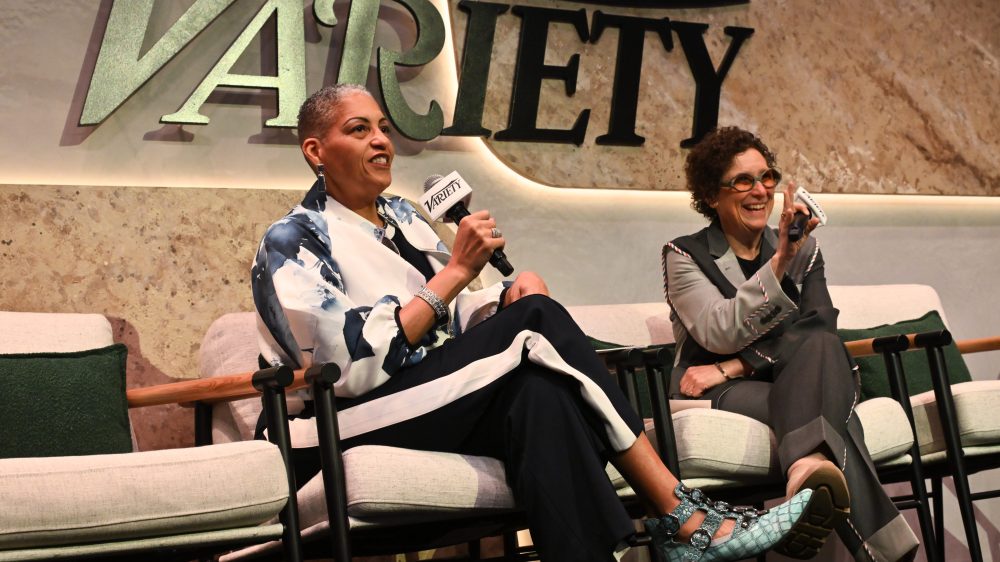Marketers face an increasingly pitched battle to grab consumers’ attention. And increasingly, they’re making it harder for themselves by taking aim at too narrow of a target.
That was one of the conclusions drawn during the session focused on reaching “the new American consumer,” held April 24 as part of Variety‘s Entertainment Marketing Summit presented by Deloitte. Later in the day, a selection of top franchise and brand management executives weighed in on the importance of world-building to extend the life of content franchises.
China Widener, Deloitte vice chair and U.S. technology, media and telecommunications industry leader, and Gayle Troberman, executive marketing advisor for iHeartMedia, talked about the challenges of sifting through huge volumes of data to develop effective marketing messages.
“What you want from the consumer is their time. You want their resources and you want their engagement. And so you have to understand where they are,” Troberman said. Troberman warned the crowd in Hollywood about missing the forest for the trees with the heavy emphasis on advanced advertising formats that now fuel sales.
“Part of the problem is we are targeting our way to oblivion. We are targeting our way to irrelevance. We need to talk to more people to sell more stuff. Not just people who love Taylor Swift and this kind of shoe and have cats and are really into pop music,” Troberman said. “If Taylor Swift just targeted Swifties, she wouldn’t be Taylor Swift and the Eras Tour wouldn’t have done a billion dollars.”
Troberman cited iHeartMedia research indicating that many consumers feel “unseen” by marketers. Widener cited Deloitte research that supports Troberman’s thesis.
“Is this a function of we’re trying to reach too many people too broadly and in a way that sort of whitewashes the notion of what actually matters to them,” Widener said. “The average consumer is spending six hours of time [on media] across multiple platforms. Whether that’s on the little screen on their phone, whether that’s actually streaming, whether that’s movies, whether that’s audio, it’s six hours a day. But in those six hours, the battle for their time and attention is extraordinary.”
The session on franchises and world-building was moderated by Rohith Nandagiri, managing director of Deloitte Consulting.
“Because of the saturation of content, it becomes much more interesting and much more engaging when you include things like building a franchise, merchandising and the way you distribute different content pieces and ancillary products,” Nandagiri said.
Deloitte Consulting’s Rohith Nandagiri, Pinterest’s Sara Pollack, AGBO’s Marian Koltai-Levine, Matte’s Josh Silverman and NBCUniversal’s David O’Connor attend the Variety Entertainment Marketing Summit presented by Deloitte
Variety via Getty Images
Josh Silverman, chief franchise officer of Mattel, emphasized that franchise management is a huge part of the toy business — one aspect that it has in common with entertainment.
“We leverage insights, we leverage research. We don’t think about consumers, we think about fans because it expands our aperture,” Silverman said. “How do we create an interconnected ecosystem truly on a global basis that allows our fans [to engage], whether it’s a T-shirt or a toy, whether it’s a live or a digital experience, whether it’s a film or a piece of content on YouTube.”
David O’Connor, president of franchise management and brand strategy for NBCUniversal Studio Group, echoed the sentiments of the earlier session with Widener and Troberman.
“As much as we like to develop global strategies, you still have to think locally and you still have to activate locally and evolve some of the creative and some of those consumer touchpoints and strategies that you might have had in place,” he said.
O’Connor offered an example of how fan enthusiasm helped the studio realize that its “Jurassic Park” film series had untapped potential. “We really wanted to understand just how potent that property was,” he said. “We did a big global study and found this property was as powerful as any of them out there.”
Marian Koltai-Levine, chief marketing officer for AGBO, the content venture lead by Joe and Anthony Russo, said the brothers’ focus has been to look outside the U.S. for new talent and new sources of viewership and fandom.
“We’re also very much globally oriented. When you look at all of our projects, you’ll see we have a lot of regional productions,” Koltai-Levine said. “We did a film in Arabic. We’ve done a film in an Italian. [2020’s] ‘Extraction’ was actually very little in English, it was mostly in Hindi. We make a very concerted effort to be respectful and aware of these regional fan bases and offer a look that you wouldn’t have normally.”
Sara Pollack, global head of consumer marketing for Pintrest, said a great deal of activity on the platform for crafts and projects revolves around expressions of fandom.
“The way that it was when I was growing up — we probably had posters all over our walls of what we were into. That very much happens on Pinterest now,” Pollack said. “To the extent that fandom is about your identity, Pinterest is a platform where people really do come to sort of figure out their identity and express their identity.”
(Pictured top: Deloitte Consulting’s China Widener and iHeart Media’s Gayle Troberman)
Read the full article here








